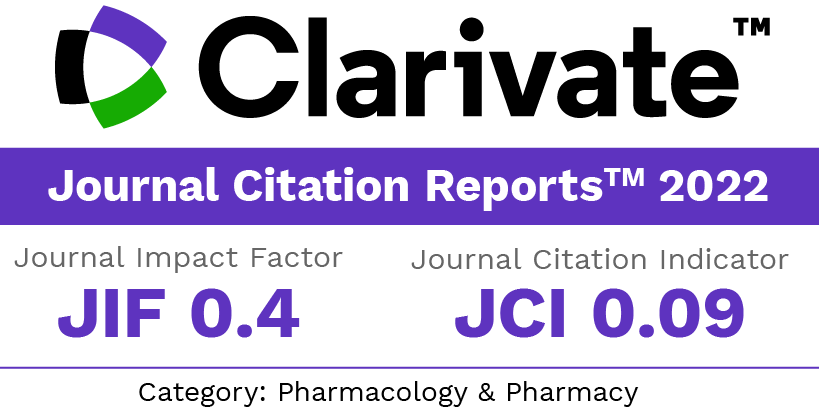Reducción gradual de dosis frente a deprescripción abrupta de antipsicóticos en pacientes con demencia: una revisión sistemática
DOI:
https://doi.org/10.30827/ars.v66i2.31635Palabras clave:
Demencia, Antipsicóticos, Prescripción inadecuada, Deprescribir, Síntomas conductualesResumen
Objetivo: Sintetizar la evidencia disponible sobre la reducción gradual de la dosis de antipsicóticos o su deprescripción abrupta en personas mayores con demencia.
Métodos: Revisión sistemática de estudios de intervención. Se consultaron las bases de datos PubMed, Embase, Web of Science-Core Collection, Cochrane Library, Scopus, MEDLINE (Ovid) y PsycINFO. Se incluyeron estudios (ensayos aleatorios o cuasiexperimentales) que evaluaban la efectividad de estrategias de deprescripción de antipsicóticos de reducción de dosis o abstinencia completa. Dos revisores independientes, triangulando por un tercer revisor realizaron el proceso de selección, extracción y análisis de datos, y evaluación del riesgo de sesgo.
Resultados: Se incluyeron 8 ensayos clínicos en la revisión sistemática, dos de los cuales fueron cuasi experimentales. Más del 60% de los participantes procedían de residencias de personas ancianas. Existe evidencia de varias estrategias para deprescribir antipsicóticos. Cinco estudios utilizaron un calendario de retiro abrupto y tres estudios utilizaron una reducción gradual de la dosis. La deprescripción mediante esquemas de retiro abrupto y gradual no mostró diferencias significativas en el manejo de los síntomas conductuales, y mostraron tasas significativamente más altas de recaída y/o eventos adversos.
Conclusión: La deprescripción de antipsicóticos es factible en personas con demencia, y se asocia a beneficios en términos de supervivencia y con posibles mejoras en el manejo y la recaída de los síntomas conductuales y psicológicos de la demencia. Parece razonable que la reducción gradual de la medicación antipsicótica se evalúe después de 12 semanas de tratamiento o cuando los síntomas conductuales estén bajo control.
Descargas
Citas
The Lancet Public Health. Will dementia hamper healthy ageing? Lancet Public Health. 2022;7(2):e93. doi: 10.1016/S2468-2667(22)00009-3. DOI: https://doi.org/10.1016/S2468-2667(22)00009-3
Nichols E, Steinmetz JD, Vollset SE, et al. Estimation of the global prevalence of dementia in 2019 and forecasted prevalence in 2050: an analysis for the Global Burden of Disease Study 2019. Lancet Public Heal. 2022;7(2):e105–25. doi: 10.1016/S2468-2667(21)00249-8. DOI: https://doi.org/10.1002/alz.051496
Cahill S. WHO’s global action plan on the public health response to dementia: some challenges and opportunities. Aging Ment Health. 2020;24(2):197-199. doi: 10.1080/13607863.2018.1544213. DOI: https://doi.org/10.1080/13607863.2018.1544213
Wimo A, Jönsson L, Bond J, Prince M, Winblad B. Alzheimer Disease International. The worldwide economic impact of dementia 2010. Alzheimers Dement. 2013;9(1):1-11.e3. doi: 10.1016/j.jalz.2012.11.006. DOI: https://doi.org/10.1016/j.jalz.2012.11.006
World Health Organization [Web page]. Dementia. 2023. Consulting: june 15 of 2024. [https://www.who.int/news-room/fact-sheets/detail/dementia]
Prince MJ, de Rodríguez JL, Noriega L, López A, Acosta D, Albanese E, et al. 10/66 Dementia research group. The 10/66 Dementia Research Group’s fully operationalised DSM-IV dementia computerized diagnostic algorithm, compared with the 10/66 dementia algorithm and a clinician diagnosis: a population validation study. BMC Public Health. 2008;8:219. doi: 10.1186/1471-2458-8-219. DOI: https://doi.org/10.1186/1471-2458-8-219
Ma H, Lu X, Zhou A, et al. Clinical Practice Guidelines for the Management of Behavioral and Psychological Symptoms of Dementia: A Systematic Review with AGREE II. Front Neurol. 2022;13:799723. doi: 10.3389/fneur.2022.799723. DOI: https://doi.org/10.3389/fneur.2022.799723
García-Alberca JM, Lara Muñoz JP, Berthier Torres M. Sintomatología neuropsiquiátrica y conductual en la enfermedad de Alzheimer. Actas Esp Psiquiatr. 2010;38(4):212-22. doi: 10.1016/s0210-4806(10)70045-0. DOI: https://doi.org/10.1016/S0210-4806(10)70045-0
Kirkham J, Sherman C, Velkers C, et al. Antipsychotic Use in Dementia. Can J Psychiatry. 2017;62(3):170-181. doi: 10.1177/0706743716673321. DOI: https://doi.org/10.1177/0706743716673321
Tampi RR, Tampi DJ, Balachandran S. Antipsychotics, Antidepressants, Anticonvulsants, Melatonin, and Benzodiazepines for Behavioral and Psychological Symptoms of Dementia: a Systematic Review of Meta-analyses. Curr Treat Options Psych. 2017;4(1):55-79. DOI: https://doi.org/10.1007/s40501-017-0104-2
Ballard C, Lana MM, Theodoulou M, et al. A randomised, blinded, placebo-controlled trial in dementia patients continuing or stopping neuroleptics (the DART-AD trial). PLoS medicine. 2008;5(4):e76. doi: 10.1371/journal.pmed.0050076. DOI: https://doi.org/10.1371/journal.pmed.0050076
Rogowska M, Thornton M, Creese B, et al.. Implications of Adverse Outcomes Associated with Antipsychotics in Older Patients with Dementia: A 2011-2022 Update. Drugs Aging. 2023;40(1):21-32. doi: 10.1007/s40266-022-00992-5. Epub 2022 Dec 14. PMID: 36513918; PMCID: PMC9747539. DOI: https://doi.org/10.1007/s40266-022-00992-5
Ballard CG, Waite J, Birks J. Atypical antipsychotics for aggression and psychosis in Alzheimer’s disease. Cochrane Database Syst Rev. 2006, Issue 1. Art. No.: CD003476. Doi: 10.1002/14651858.CD003476.pub2 DOI: https://doi.org/10.1002/14651858.CD003476.pub2
Watt JA, Thompson W, Marple R, Brown D, Liu B. Managing neuropsychiatric symptoms in patients with dementia. BMJ. 2022;376:e069187. doi: 10.1136/bmj-2021-069187. DOI: https://doi.org/10.1136/bmj-2021-069187
Schneider LS, Dagerman KS, Insel P. Risk of Death with Atypical Antipsychotic Drug Treatment for Dementia. JAMA. 2005;294(15):1934-43. DOI: https://doi.org/10.1001/jama.294.15.1934
Zuidema SU, Johansson A, Selbaek G, et al. A consensus guideline for antipsychotic drug use for dementia in care homes. Bridging the gap between scientific evidence and clinical practice. Int Psychogeriatr. 2015;27(11):1849-59. doi: 10.1017/S1041610215000745. DOI: https://doi.org/10.1017/S1041610215000745
Reeve E, Gnjidic D, Long J, Hilmer S. A systematic review of the emerging definition of “deprescribing” with network analysis: Implications for future research and clinical practice. Br J Clin Pharmacol. 2015;80(6):1254-68. doi: 10.1111/bcp.12732 DOI: https://doi.org/10.1111/bcp.12732
Page MJ, McKenzie JE, Bossuyt PM, et al. The PRISMA 2020 statement: an updated guideline for reporting systematic reviews. BMJ. 2021;372:n71. doi:10.1136/bmj.n71 DOI: https://doi.org/10.1136/bmj.n71
Higgins JPT, Altman DG, Gøtzsche PC, et al. The Cochrane Collaboration’s tool for assessing risk of bias in randomized trials. BMJ. 2011;343:d5928. doi: 10.1136/bmj.d5928. DOI: https://doi.org/10.1136/bmj.d5928
Page AT, Clifford RM, Potter K, Schwartz D, Etherton-Beer CD. The feasibility and effect of deprescribing in older adults on mortality and health: a systematic review and meta-analysis. Br J Clin Pharmacol. 2016;82(3):583-623. doi: 10.1111/bcp.12975. DOI: https://doi.org/10.1111/bcp.12975
Escudero TJ, Fernández VE, Peris MJ. Papel de los antipsicóticos en el tratamiento de los síntomas psicológicos y conductuales de los pacientes con demencia. Optimizando su prescripción. Valencia; 2021. [Consulted 13 April 2023]. Available from: https://www.fundacionfemeba.org.ar/blog/farmacologia-7/post/papel-de-los-antipsicoticos-en-el-tratamiento-de-los-sintomas-psicologicos-y-conductuales-de-los-pacientes-con-demencia-optimizando-su-prescripcion-49654
CADIME. Polimedicación y deprescripción: recomendaciones prácticas. Bol Ter Andal. 2021;36(1). [Consulted 19 February 2023] Available from: https://www.cadime.es/images/documentos_archivos_web/BTA/2021/CADIME_BTA_2021_36_01.pdf.
CADIME. Antipsicóticos para el tratamiento de síntomas del comportamiento en las demencias. Bol Ter Andal. 2018;33(3). [Consulted 17 January 2023] Available from: https://cadime.es/images/documentos_archivos_web/BTA/2018/CADIME_BTA_33_03.pdf
van Reekum R, Clarke D, Conn D, et al. A randomized, placebo-controlled trial of the discontinuation of long-term antipsychotics in dementia. Int Psychogeriatr. 2002;14(2):197-210. doi: 10.1017/s1041610202008396. DOI: https://doi.org/10.1017/S1041610202008396
Ballard C, Thomas A, Fossey J, et al. A 3-month, randomized, placebo-controlled, neuroleptic discontinuation study in 100 people with dementia: the neuropsychiatric inventory median cutoff is a predictor of clinical outcome. J Clin Psychiatry. 2004;65(1):114-9. doi: 10.4088/jcp.v65n0120. DOI: https://doi.org/10.4088/JCP.v65n0120
Ruths S, Straand J, Nygaard HA, Aarsland D. Stopping antipsychotic drug therapy in demented nursing home patients: a randomized, placebo-controlled study. The Bergen District Nursing Home Study (BEDNURS). Int J Geriatr Psychiatry. 2008;23(9):889-95. doi: 10.1002/gps.1998. DOI: https://doi.org/10.1002/gps.1998
Ballard C, Hanney ML, Theodoulou M, et al. The dementia antipsychotic withdrawal trial (DART-AD): long-term follow-up of a randomised placebo-controlled trial. Lancet Neurol. 2009;8(2):151-7. doi: 10.1016/S1474-4422(08)70295-3. DOI: https://doi.org/10.1016/S1474-4422(08)70295-3
Devanand DP, Pelton GH, Cunqueiro K, Sackeim HA, Marder K. A 6-month, randomized, double-blind, placebo-controlled pilot discontinuation trial following response to haloperidol treatment of psychosis and agitation in Alzheimer’s disease. Int J Geriatr Psychiatry. 2011;26(9):937-43. doi: 10.1002/gps.2630. DOI: https://doi.org/10.1002/gps.2630
Devanand DP, Pelton GH, Andrews HF, et al. Relapse Risk after Discontinuation of Risperidone in Alzheimer’s Disease. N Engl J Med. 2012;367(16):1497-507. doi: 10.1056/NEJMoa1114058. DOI: https://doi.org/10.1056/NEJMoa1114058
Bravo-José P, Einstein CA, Sáez-Lleó CI, Peris-Martí JF. Deprescrpción de antipsicóticos en pacientes institucionalizados con demencia. Farm Hosp. 2019;43(4):140–5.
Brodaty H, Aerts L, Harrison F, et al. Antipsychotic Deprescription for Older Adults in Long-term Care: The HALT Study. J Am Med Dir Assoc. 2018;19(7):592-600.e7. doi: 10.1016/j.jamda.2018.05.002. DOI: https://doi.org/10.1016/j.jamda.2018.05.002
Moth AE, Hølmkjær P, Holm A, Rozing MP, Overbeck G. What Makes Deprescription of Psychotropic Drugs in Nursing Home Residents with Dementia so Challenging? A Qualitative Systematic Review of Barriers and Facilitators. Drugs Aging. 2021;38(8):671-685. doi: 10.1007/s40266-021-00875-1. DOI: https://doi.org/10.1007/s40266-021-00875-1
van Leeuwen E, Petrovic M, van Driel ML, et al. Discontinuation of Long-Term Antipsychotic Drug Use for Behavioral and Psychological Symptoms in Older Adults Aged 65 Years and Older With Dementia. J Am Med Dir Assoc. 2018;19(11):1009-1014. doi: 10.1016/j.jamda.2018.06.023. DOI: https://doi.org/10.1016/j.jamda.2018.06.023
Azermai M, Petrovic M, Engelborghs S, et al. The effects of abrupt antipsychotic discontinuation in cognitively impaired older persons: A pilot study. Aging Ment Health. 2013;17(1):125-32. doi: 10.1080/13607863.2012.717255. DOI: https://doi.org/10.1080/13607863.2012.717255
Rodolico A, Siafis S, Bighelli I, et al. Antipsychotic dose reduction compared to dose continuation for people with schizophrenia. Cochrane Database Syst Rev. 2022;11(11):CD014384. doi: 10.1002/14651858.CD014384.pub2. DOI: https://doi.org/10.1002/14651858.CD014384.pub2
Takeuchi H, Remington G. Immediate versus wait-and-gradual discontinuation in antipsychotic switching: A meta-analysis. J Psychopharmacol. 2020;34(8):914-919. doi: 10.1177/0269881120922964. DOI: https://doi.org/10.1177/0269881120922964
Sheehan R, Hassiotis A. Reduction or discontinuation of antipsychotics for challenging behaviour in adults with intellectual disability: a systematic review. Lancet Psychiatry. 2017;4(3):238-256. doi: 10.1016/S2215-0366(16)30191-2. DOI: https://doi.org/10.1016/S2215-0366(16)30191-2
Gao RL, Lim KS, Luthra AS. Discontinuation of antipsychotics treatment for elderly patients within a specialized behavioural unit: a retrospective review. Int J Clin Pharm. 2021;43(1):212-219. doi: 10.1007/s11096-020-01135-9. DOI: https://doi.org/10.1007/s11096-020-01135-9
Begemann MJH, Thompson IA, Veling W, et al. To continue or not to continue? Antipsychotic medication maintenance versus dose-reduction/discontinuation in first episode psychosis: HAMLETT, a pragmatic multicenter single-blind randomized controlled trial. Trials. 2020;21(1):147. doi: 10.1186/s13063-019-3822-5. DOI: https://doi.org/10.1186/s13063-019-3822-5
Calsolaro V, Femminella GD, Rogani S, et al. Behavioral and Psychological Symptoms in Dementia (BPSD) and the Use of Antipsychotics. Pharmaceuticals (Basel). 2021;14(3):246. doi: 10.3390/ph14030246. DOI: https://doi.org/10.3390/ph14030246
National Institute for Health and Care Excellence (NICE) 2018. Dementia: Assessment, management and support for people living with dementia and their carers. NICE Guidelines (NG 97).
Huang YY, Teng T, Shen XN, et al. Pharmacological treatments for psychotic symptoms in dementia: A systematic review with pairwise and network meta-analysis. Ageing Res Rev. 2022;75:101568. doi: 10.1016/j.arr.2022.101568. DOI: https://doi.org/10.1016/j.arr.2022.101568
Ballard, C., Powell, I., James, I., et al. Reichelt, K. Can psychiatric liaison reduce neuroleptic use and reduce health service utilization for dementia patients residing in care facilities. Int. J. Geriat. Psychiatry, 2022;17: 140-145. doi.org/10.1002/gps.543 DOI: https://doi.org/10.1002/gps.543
Sanfélix-Gimeno G, Cervera-Casino P, Peiró S, López-Valcárcel BG, Blázquez A, Barbera T. Effectiveness of safety warnings in atypical antipsychotic drugs: an interrupted time-series analysis in Spain. Drug Saf. 2009;32(11):1075-87. doi: 10.2165/11316520-000000000-00000. DOI: https://doi.org/10.2165/11316520-000000000-00000
Kales HC, Maust DT. Good Intentions, But What About Unintended Consequences? Drug Saf. 2017;40(8):647-649. doi: 10.1007/s40264-017-0554-x. DOI: https://doi.org/10.1007/s40264-017-0554-x
Colla CH, Mainor AJ, Hargreaves C, Sequist T, Morden N. Interventions Aimed at Reducing Use of Low-Value Health Services: A Systematic Review. Med Care Res Rev. 2017;74(5):507-550. doi: 10.1177/1077558716656970. DOI: https://doi.org/10.1177/1077558716656970
Colquhoun HL, Squires JE, Kolehmainen N, Fraser C, Grimshaw JM. Methods for designing interventions to change healthcare professionals’ behavior: a systematic review. Implement Sci. 2017;12(1):30. doi: 10.1186/s13012-017-0560-5. DOI: https://doi.org/10.1186/s13012-017-0560-5
Cohen-Mansfield J. The Rights of Persons with Dementia and Their Meanings. J Am Med Dir Assoc. 2021;22(7):1381-1385. doi: 10.1016/j.jamda.2021.03.007. DOI: https://doi.org/10.1016/j.jamda.2021.03.007
Descargas
Publicado
Cómo citar
Número
Sección
Licencia
Derechos de autor 2025 0000-0003-1509-1198 Martin-Ruiz

Esta obra está bajo una licencia internacional Creative Commons Atribución-NoComercial-CompartirIgual 4.0.
Los artículos que se publican en esta revista están sujetos a los siguientes términos en relación a los derechos patrimoniales o de explotación:
- Los autores/as conservarán sus derechos de autor y garantizarán a la revista el derecho de primera publicación de su obra, la cual se distribuirá con una licencia Creative Commons BY-NC-SA 4.0 que permite a terceros reutilizar la obra siempre que se indique su autor, se cite la fuente original y no se haga un uso comercial de la misma.
- Los autores/as podrán adoptar otros acuerdos de licencia no exclusiva de distribución de la versión de la obra publicada (p. ej.: depositarla en un archivo telemático institucional o publicarla en un volumen monográfico) siempre que se indique la fuente original de su publicación.
- Se permite y recomienda a los autores/as difundir su obra a través de Internet (p. ej.: en repositorios institucionales o en su página web) antes y durante el proceso de envío, lo cual puede producir intercambios interesantes y aumentar las citas de la obra publicada. (Véase El efecto del acceso abierto).
























